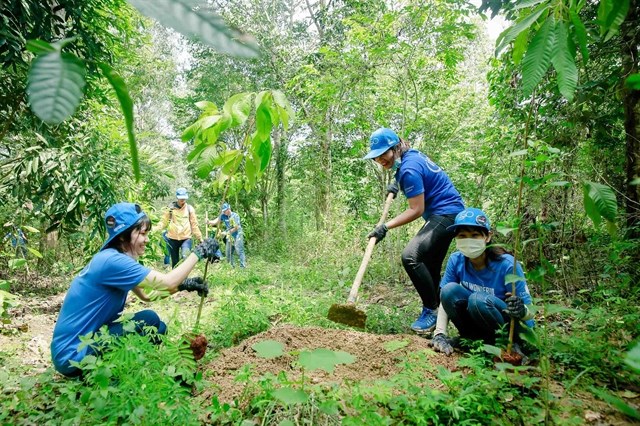
More than 1,000 trees of five species of native timber trees and wild plants have been planted on 20,000sq.m in the Dong Nai World Biosphere Reserve as part of an effort to improve the habitats of elephants and other wildlife.
More than 1,000 trees of five species of native timber trees and wild plants have been planted on 20,000sq.m in the Dong Nai World Biosphere Reserve as part of an effort to improve the habitats of elephants and other wildlife.
 |
| A programme to restore Dong Nai World Biosphere Reserve creates an abundant food source for elephants and other wild species. (Photo courtesy of the Gaia Read) |
Planting, which took place June 25-28, is part of the programme titled "Forest Plantation and Monitoring" which Gaia Nature Conservation continues to carry out to enrich the Dong Nai forest.
The kinds of trees include Huynh (Palapi), wild jackfruit, wild rambutan, wild mango, and Sau (Dracontomelon duperreanum).
The aim of the programme is to recover poor forests, supplement food sources and improve the habitats of elephants and endangered wildlife such as gaur, hornbill and black-shanked douc.
The reserve is the habitat for one of the last populations of wild elephants in Vietnam.
Less than 50 wild elephants live in the wild in Vietnam. Of those, 11-14 live in Dong Nai.
In 2010, seven wild elephants could not find enough food in the forest and died after looking for cashew and mango fields. Farmers saw them as a threat and poisoned them.
After this tragedy, the Dong Nai World Biosphere Reserve installed 50 kilometres of electric fencing to prevent elephants from going into residential areas.
However, a few elephants have managed to break through the fence.
Restoring forests and creating an abundant food source for the elephants and other wild species is a long-term solution to the problem.
The forest will be monitored and taken care of for four years to ensure its sustainability.
Do Thi Thanh Huyen, founder and director of Gaia Nature Conservation Centre, said during urbanisation, the total area and quality of the forest in Vietnam is decreasing and we are seeing habitat loss and an ecological loss of function.
In the future, Gaia will continue to promote forest planting and monitor programmes in other places such as Tram Chim National Park and Can Gio Biosphere Reserve.
Gaia has called for support from companies, schools and individuals to join Gaia in the forest plantation and monitoring programme to improve overall forest function, protect endangered species, and restore and enrich the forest.
(Source:VNA)




![[Photo series] Admiring the most beautiful riverside road in Dong Nai before its technical traffic opening](/file/e7837c02876411cd0187645a2551379f/012026/nen_20260114174655.jpg?width=500&height=-&type=resize)